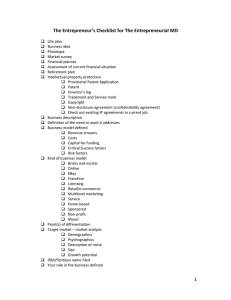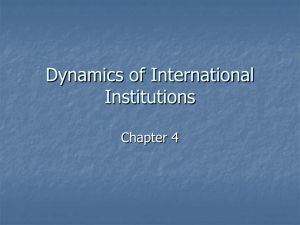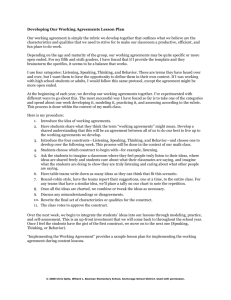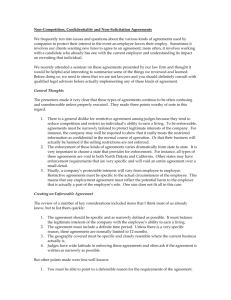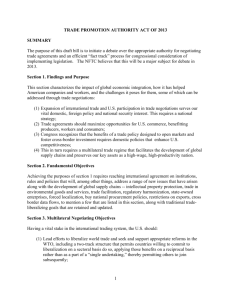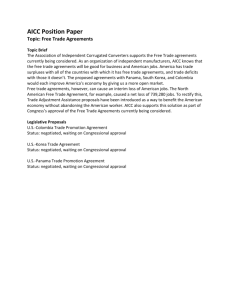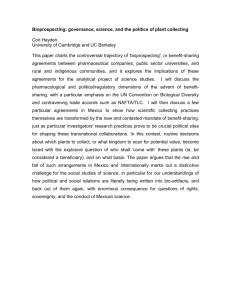TD United Nations Conference on Trade and
advertisement
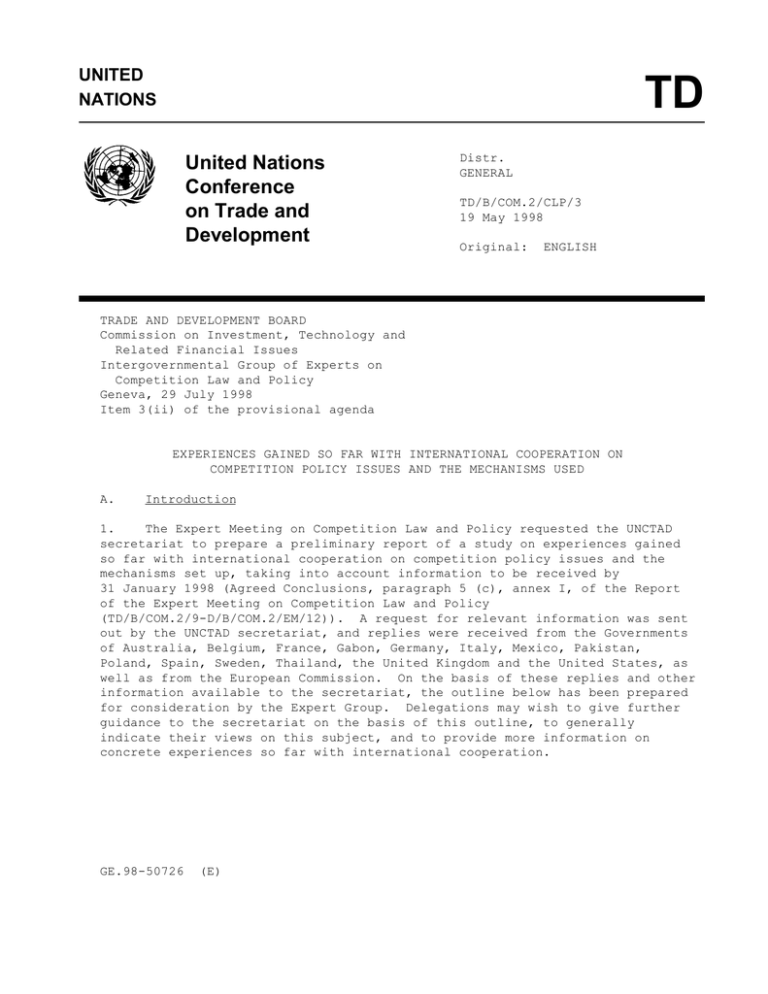
UNITED NATIONS TD United Nations Conference on Trade and Development Distr. GENERAL TD/B/COM.2/CLP/3 19 May 1998 Original: ENGLISH TRADE AND DEVELOPMENT BOARD Commission on Investment, Technology and Related Financial Issues Intergovernmental Group of Experts on Competition Law and Policy Geneva, 29 July 1998 Item 3(ii) of the provisional agenda EXPERIENCES GAINED SO FAR WITH INTERNATIONAL COOPERATION ON COMPETITION POLICY ISSUES AND THE MECHANISMS USED A. Introduction 1. The Expert Meeting on Competition Law and Policy requested the UNCTAD secretariat to prepare a preliminary report of a study on experiences gained so far with international cooperation on competition policy issues and the mechanisms set up, taking into account information to be received by 31 January 1998 (Agreed Conclusions, paragraph 5 (c), annex I, of the Report of the Expert Meeting on Competition Law and Policy (TD/B/COM.2/9-D/B/COM.2/EM/12)). A request for relevant information was sent out by the UNCTAD secretariat, and replies were received from the Governments of Australia, Belgium, France, Gabon, Germany, Italy, Mexico, Pakistan, Poland, Spain, Sweden, Thailand, the United Kingdom and the United States, as well as from the European Commission. On the basis of these replies and other information available to the secretariat, the outline below has been prepared for consideration by the Expert Group. Delegations may wish to give further guidance to the secretariat on the basis of this outline, to generally indicate their views on this subject, and to provide more information on concrete experiences so far with international cooperation. GE.98-50726 (E) TD/B/COM.2/CLP/3 Page 2 B. Types of cooperation 2. International cooperation in the area of competition law and policy can take place either on an informal basis or in the application of an international instrument. There are basically five types of such instruments: bilateral agreements dealing solely with cooperation on competition law enforcement; bilateral agreements relating to mutual assistance in criminal matters, including criminal antitrust cases; bilateral agreements providing for technical cooperation on competition policy and related areas; regional agreements or bilateral agreements concluded within a regional framework, covering competition policy aspects within larger agreements on free trade or economic integration; and legally binding or non-binding multilateral instruments, including both those which are universally applicable and those which are of a “plurilateral” nature. In practice, the borderlines between these different types of agreements are sometimes blurred. A brief overview of them and some of their provisions is provided below, and a preliminary table (see p.5) has been prepared listing some of them and their provisions. This table would be refined and completed in the final study, thus making it unnecessary to review the provisions of each agreement in detail. The study would provide a list of the different agreements, describe typical provisions in them, highlight certain features, make comparisons as appropriate, and describe experiences with their implementation. After a discussion of cooperation on the basis of such agreements, types of informal cooperation, and experiences in relation thereto, would be described. C. Bilateral agreements on competition law enforcement 3. There are several cooperation agreements in this area, such as those between the United States and, respectively, Australia, Canada, Germany and the European Commission, between Australia and New Zealand, and between France and Germany. With variations, depending on the individual agreement, they may include provisions relating to notification of enforcement activities; commitments to take into account the other party’s significant interest when investigating or applying remedies against restrictive business practices (RBPs) (traditional comity); consultations to resolve conflicts between respective laws, policies and national interests; voluntary procedures for exchange of non-confidential and (subject to adequate safeguards) confidential information; administrative or judicial assistance for investigation or enforcement by another party; and coordinated action in respect of related RBPs occurring in both countries. Distinctions would be made between the older agreements primarily concerned with avoiding conflicts among national authorities arising out of competition law enforcement proceedings, and the newer generation of agreements also aimed at cooperative international action against RBPs. Some recent agreements provide, for instance, for “positive comity”, under which one competition authority can ask the other party to control RBPs adversely affecting the first country’s important interests which originate in the other country (response to such requests is voluntary). D. Bilateral agreements for mutual assistance in criminal cases 4. There are agreements of this type only between Canada and the United States and between Germany and the United States, involving very far-reaching cooperation in respect of criminal action against cartels. TD/B/COM.2/CLP/3 Page 3 E. Bilateral agreements for technical cooperation on competition policy 5. Under a 1992 technical cooperation agreement between the French Direction Générale de la Consommation et de la Répression dés Fraudes (DGCRF) and the Direction Générale de la Consommation (DGCN) of Gabon, for example, the two bodies are to cooperate in such areas as competition policy, consumer protection, unfair competition, product quality and safety, and prices of products. In the implementation of this agreement, the DGCN has sent its personnel for short-term or long-term training at centres run by the DGCRF. More information would be sought about such agreements and their implementation. F. Regional agreement 6. The most advanced regional system of competition rules is certainly that of the European Union, which in application of the Treaty of Rome and regulations made thereunder, enforces supranational competition rules. There is close cooperation between the European Commission and European Union (EU) national competition authorities, and among national authorities, involving inter alia parallel application of national and EU competition laws and a system for allocation of competence among the different competition authorities. Less far-reaching competition rules apply among countries of the European Free Trade Association (EFTA), but the competition rules of the EU now apply to member countries of the European Economic Area. Rules based on EU competition law have been extended to trade with several Eastern European and Mediterranean countries, as well as with Turkey, under different series of agreements. Relatively less far-reaching Partnership and Cooperation agreements have been concluded between the EU and countries of the Commonwealth of Independent States (CIS). Agreements have also been concluded by EFTA States and by Israel with some Central and Eastern countries, and within this latter group of countries. 7. The North American Free Trade Agreement (NAFTA), which applies to Canada, the United States and Mexico, includes a number of provisions relating to competition law. In particular, Article 1501 provides that: “(i) Each Party shall adopt or maintain measures to proscribe anti-competitive business conduct and take appropriate action with respect thereto, recognizing that such measures will enhance the fulfilment of objectives of this agreement. To this end the Parties shall consult from time to time about the effectiveness of measures taken by the other party. (ii) Each Party recognizes the importance of cooperation and coordination among their authorities to further effective competition law enforcement in the free trade area. The Parties shall cooperate on issues of competition law enforcement policy, including mutual legal assistance, notification, consultation and exchange of information relating to the enforcement of competition laws and policies in the free trade area. (iii) No Party shall have recourse to dispute settlement under the Agreement for any matter regarding this Article.” TD/B/COM.2/CLP/3 Page 4 8. MERCOSUR , the “Common Market of the Southern Cone” of South America, was formed on 26 March 1991 by the Treaty of Asunción and currently consists of Argentina, Brazil, Paraguay and Uruguay, with Chile and Bolivia becoming associate members as of 1 October 1996 and 1 March 1997, respectively. Competition policy is among the many topics foreseen as the subject of coordination at the MERCOSUR level. The latest MERCOSUR Protocol on Competition Policy, which was approved in December 1996, does not become effective until it has been incorporated into each member's legal system in accordance with national legislation, while common norms to control anti-competitive acts and agreements are expected to be completed within two years. The main features of the Protocol are as follows: (i) (ii) (iii) All concerted agreements whose purpose or effect is to impede, restrict or distort competition or free access to markets, or that abuse a dominant position in a relevant market of goods and services within MERCOSUR and affect trade between the member States are against the Protocol; The MERCOSUR Commerce Commission and the Technical Committee on Competition Policy will enforce through the power of injunctions, consent decrees, fines etc. (imposed by national agencies) the norms set out in the Protocol, supplemented by the dispute resolution systems of the Brasília Protocol; National competition agencies will adopt measures to enhance cooperation with each other in order to implement the Protocol. 9. Decision 285 of the Commission of the Cartagena Agreement, establishing the Andean Pact, provides for the prevention of or remedies against distortions to competition resulting from the application of RBPs adversely affecting free competition. There are less far-reaching provisions in the Caribbean Community (CARICOM) Treaty. The free trade agreements between Canada and Chile, and among Mexico, Colombia and Venezuela, also contain provisions relating to cooperation on competition policy. Competition policy is also addressed in the Treaty Establishing the Common Market for Eastern and Southern Africa, and in the Traité de l’Union Douanière de l’Afrique Centrale. Very far-reaching cooperation on competition law and policy is provided for in the Australia-New Zealand Closer Economic Relations Trade Agreement. A forum for exchanges of views, technical cooperation and discussion of competition issues is provided under the aegis of Asia-Pacific Economic Cooperation (APEC); and a database of information on competition law in APEC countries is being set up. A similar mechanism for cooperation on competition policy has been created in the context of discussions on the establishment of a Free Trade Area of the Americas (FTAA). G. Multilateral instruments 10. The sole universally applicable multilateral instrument in this area is the non-binding Set of Multilaterally Agreed Equitable Principles and Rules for the Control of Restrictive Business Practices, negotiated and implemented by UNCTAD. The cooperation aspects of the Set would be briefly reviewed. Non-binding “plurilateral” instruments adopted by the Organization for Economic Cooperation and Development (OECD) relating to competition law and TD/B/COM.2/CLP/3 Page 5 policy would also be covered. The latest Revised Recommendation of the OECD Council Concerning Cooperation Between Member Countries on Anticompetitive Practices Affecting International Trade - adopted in 1995 - provides, for instance, for notification, exchange of information, mutual assistance in investigations, coordination of investigations, positive comity, consultations, and a conciliation mechanism in the field of competition law enforcement. The 1998 OECD Recommendation concerning effective action against hard-core cartels recommends convergence and effectiveness of laws prohibiting such cartels, and international cooperation and comity in enforcing those laws. It is open to non-OECD member countries to associate themselves with this Recommendation and to implement it. The Uruguay Round Agreements, which are of course binding and subject to dispute settlement mechanisms, contain some provisions relating to cooperation in the area of competition law and policy. Selected agreements on international cooperation in competition law and policy, and their provisions United States Australia Canada European Union France Germany 1981 - Exchange of information - Confidentiality - Consultations European Union New Zealand Czech Republic 1990 - Harmonization of competition law - Mutual assistance in enforcement - Notification - Consultation - Cooperation 1991 - Notification - Exchange of information - Cooperation and coordination in enforcement activities 1995 - Consultations - Confidentiality - Joint review of cases, including preferential aid 1984 - Exchange of information Confidentiality - Consultations CIS countries TD/B/COM.2/CLP/3 Page 6 Germany 1976 - Exchange of information - Confidentiality - Consultations Eastern Europe Bulgaria, Czech Rep., Estonia, Hungary, Latvia, Lithuania, Poland, Romania, Slovak Rep., Slovenia Model of “Europe Agreement” provides for harmonization of competition laws. EU competition rules apply to trade between parties Bilateral cooperation agreement among member countries Mediterranean Basin Rules based on EU competition rules apply to trade between parties Experience sharing and harmonization of competition laws Tunisia, Morocco, Israel. H. Informal cooperation 11. Large numbers of contacts among competition authorities, exchanges of non-confidential information and technical cooperation activities take place on an informal basis. The main types of informal technical cooperation include: participation in seminars and training courses; visits to, or training attachments with, competition authorities in developed countries; short-term missions to countries needing cooperation, including analyses of their situation and needs, workshops, group training and assistance on particular issues or in the drafting of legislation; and long-term attachments of personnel from authorities of developed countries for training and advice purposes with authorities of developing or Eastern European countries. I. Evaluation cooperation experience 12. In the light of information provided by Governments and other available information, an overall evaluation would be undertaken of experiences with respect to the implementation of cooperation agreements or of informal cooperation, and of the mechanisms used. Examples of both successes and failures would be discussed, illustrated where appropriate by reference to the procedures followed in individual cases (such as the Boeing/McDonnell Douglas, Ciba-Geigy/Sandoz, Citric Acid, Fax Paper, General Electric/De Beers, Lysine, Microsoft, Nielsen, Plastic Dinnerware or Sabre cases). Factors conducive to successful cooperation, and obstacles to cooperation, would be identified and TD/B/COM.2/CLP/3 Page 7 discussed. The latter may include differences in the objectives, substantive content, enforcement practices or procedures, jurisdictional scope or levels of expertise of competition laws or competition authorities; restrictions relating to the exchange of confidential information; lack of a formal cooperation agreement; the internal structure of competition agencies; insufficient planning and coordination of technical cooperation activities; lack of data; or lack of resources. In the light of this analysis, proposals would be made to strengthen, expand and make more effective international cooperation in this area. -----

